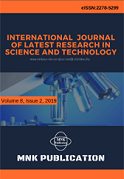DOI:10.29111/ijlrst ISRA Impact Factor:3.35
Open Access
International Journal of Latest Research in Science and Technology Vol.10 Issue 1, pp 42-45,Year 2021
Correspondence should be addressed to :
Received : 04 April 2021; Accepted : 20 April 2021 ; Published : 25 April 2021

| Download | 128 |
|---|---|
| View | 185 |
| Article No. | 11018 |
This paper aims to review the potency owned by benchmarking enriching the management to apply in the organization. The data and ideas on this paper come essentially from review of articles relating to the benchmarking in the organization. The grade of success to benchmark in assorted companies varies among them because of the different management cultures and desires. Benchmarking process doesn’t only collect data on practices of a corporation attains against other companies but also the way to confess a replacement idea and a replacement method to enhance the method and to be better to satisfy the customer’s satisfaction. This paper provides as a description for the practitioners to improve to be better organization.
Copyright © 2021 Sahala Siallagan et al. This is an open access article distributed under the Creative Commons Attribution 4.0 International (CC BY 4.0) license which permits unrestricted use, distribution, and reproduction in any medium, provided the original work is properly cited.
Sahala Siallagan , " The Enormous Potency Of Benchmarking ", International Journal of Latest Research in Science and Technology . Vol. 10, Issue 1, pp 42-45 , 2021

MNK Publication was founded in 2012 to upholder revolutionary ideas that would advance the research and practice of business and management. Today, we comply with to advance fresh thinking in latest scientific fields where we think we can make a real difference and growth now also including medical and social care, education,management and engineering.

We offers several opportunities for partnership and tie-up with individual, corporate and organizational level. We are working on the open access platform. Editors, authors, readers, librarians and conference organizer can work together. We are giving open opportunities to all. Our team is always willing to work and collaborate to promote open access publication.

Our Journals provide one of the strongest International open access platform for research communities. Our conference proceeding services provide conference organizers a privileged platform for publishing extended conference papers as journal publications. It is deliberated to disseminate scientific research and to establish long term International collaborations and partnerships with academic communities and conference organizers.